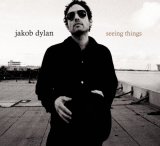and i ain’t changed, but i know i ain’t the same
posted at 1:51 am by brandon in mine's on the 45At first glance, his career may well seem star-crossed: the youngest son of a man who is widely regarded to be the planet’s finest songwriter decides to stake his own claim on his father’s profession. The son forms a band, stumbles more or less across instant success (give or take an unfocused yet promising debut album) by tossing top 40 radio one of the smartest tandems of smash singles the format has ever seen. The son — whose devilishly smoldering (if slightly off-kilter) good looks only serve to cement his status as a lustworthy rock star — lands on every relevant magazine cover in creation, and the band, showered by now with gushes and with Grammys, seems to be riding a unstoppable rocketship straight to the top.
Except: in a brilliantly faulty judgment call, the band waits four years to write and record the follow-up to their shattering breakthrough, by which time the gurus of pop culture have deemed their style of music — so ubiquitous in their brief heyday — to be unforgivably gauche. The album fails to sell, and so do the next two (despite a handful of killer tunes contained therein), and the band, who had made their pilgrimage to the pinnacle seem so damned simple, realizes just how imperceptibly fleeting celebrity can be.
The Wallflowers are far from dead (or so they swear), but the band’s lead singer Jakob Dylan (son of Bob, natch) has just released his first solo project, a spare and haunting album called Seeing Things that is built around an acoustic guitar and, more importantly, around Dylan’s reedy yet undeniably affecting voice, an instrument that sold five million copies of its band’s second CD — 1996’s classic Bringing Down the Horse — a decade ago solely by transforming forlorn songs about homelessness (the mind-blowingly fine “6th Avenue Heartache,” which featured a to-die-for harmony vocal from head Crow Counter Adam Duritz) and suicide (the monumental “One Headlight”) into radio-friendly pop fodder.
The slight hint of resignation that now emanates from his vocals seems to suggest that Dylan is perfectly at peace to be respected as a songwriter and nothing more. (And, maybe just maybe, that was his goal all the while.) And although it’s sometimes too quiet and too unassuming, Seeing Things is a striking collection of songs from a man who long ago proved that although fame — particularly the sudden variety of same — is transient, talent isn’t.




